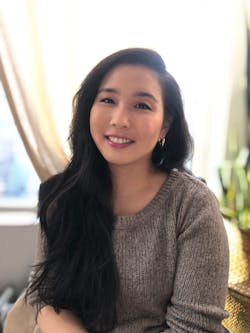A new kind of mentorship: How Browngirl, RDH is helping diversify the dental industry
When Martelle Coke entered dental hygiene school in 2009, she was alarmed to see that she was the only Black woman in the room, and that her peers had arrived with more resources and preparation for their chosen field. The next surprise came when her instructor passed out a list of required, self-funded dental school supplies, totaling two thousand dollars—two thousand dollars Coke simply did not have.
Inequality in the dental field
Coke’s experience is indicative of a larger issue; like most industries in the United States, dentistry has a problem with race, representation, and equity. Recent data, for instance, shows that only 4% of dental hygienists are Black, a shocking number in our increasingly diverse country.1 According to a study by the Journal of Dental Education, several key factors have led to this lack of diversity in dentistry, including a lack of undergraduate preparation, low awareness of dental careers, and the steep costs associated with dental school.2 In the face of such barriers, mentorship can be an effective tool to increase diversity and inclusion within dentistry—but according to Coke, a traditional one-size-fits-all approach might not make for the best mentorship experience.3
“People often think mentorship is just career development, or something to put on your resume,” Coke said. “But it needs to go much deeper, and account for the mentee’s background. Mentors should be able to say, ‘I am here for you, I see you, I am a reflection of you.’” Successful mentorship, Coke argued, requires an understanding that life circumstances, privilege, and structural disadvantages play an important part in professional growth and success.
Meet Martelle Coke
If the name “Martelle Coke” sounds familiar to you, it’s because you’ve likely seen the 33-year-old hygienist, entrepreneur, and founder before—gracing the pages of Dental Entrepreneur Woman, RDH Magazine, and more. Since 2018, her non-profit organization BrownGirl, RDH has provided mentorship services and given out over $17K in scholarships to 14 recipients in the dental industry.
When I spoke with Coke over the phone, she was quick to remind me: “It wasn’t always this way.” Without the wisdom of a mentor, Coke learned about the basics—where to apply for student loans, what credit cards were, how to pay down debt—the hard way. “College readiness programs don’t exist in poorly funded high schools in impoverished communities, like the one I grew up in,” Coke said. “I had no idea that I would need to self-fund over $2,000 worth of supplies for school. I sold my gold necklace, which is funny to me now, because it was only worth $180—but that just shows you how little I knew about money and value at that time. Having a mentor to help me through that would’ve changed everything.” This, Coke emphasized, is one key area that mentorship can and should address: developing the skills and know-how required to navigate systemic tools and resources such as financial aid.
Even after graduating from dental hygiene school, Coke faced a whole host of challenges in the workplace. To stave off the persistent stereotype that Black people are “lazier” than others, Coke worked 10 times harder. When colleagues, employers, and even patients made racist remarks—some patients, she explained, would ask to be treated by a non-Black hygienist—Coke learned to adapt.
Coke began to reflect on the unique challenges she faced in the world of dentistry—and realized she wasn’t alone. “I thought, if I exist, there must be so many other Black people out there—Latinx, Asian, and Indigenous people, too—who might be suffering from these issues, and might need support like me. So, I started BrownGirl, RDH.”
Since its founding two years ago, BrownGirl, RDH now boasts a community of 13,000 people. As part of their larger support system, the non-profit offers mentorship opportunities for dental students and professionals of color with unique lived experiences. “Having a mentor matters—not just so that you can understand how to progress in the workplace, but also so that you have someone who hears you, listens to you, and can be your emotional support when you’re dealing with racial microaggressions and unique life challenges,” said Coke. Mentees who deal with race-related stress, she noted, benefit greatly when they can find a mentor who is willing to help them not only to cope, but to resolve uncomfortable situations effectively, and in their favor.
Mentorship, community, and diversifying dentistry
When I asked Coke why she believed mentorship and community were critical to diversifying dentistry, she directed me to a dozen or so stories of young hygienists of color, who were able to start their own businesses, become speakers, or find the resources to fund their education—all thanks to the wider community of mentors and supporters. “Sometimes, the struggle is not being able to afford basic dental school supplies, equipment, and examination fees,” she explained. “Other times, it’s finding the courage to persevere despite a hostile working environment, or finding a safe space to just talk about it. When mentors step in to address those issues—not just what job to apply for or what to put on your resume—they can help create an industry that’s welcoming to dental professionals of all backgrounds.”
Coke also pointed to the story of a Black hygiene school student in her network. “I received a phone call from the student’s mentor-instructor, who let me know that his student couldn’t graduate or take his board exams until he could pay his remaining tuition balance of $10K,” she told me. “When I spoke to the student, he told me his story: He was a veteran, homeless, robbed at gunpoint, and was currently sneaking into empty storage units to sleep.” Coke shared the student’s story through BrownGirl, RDH’s Instagram Live—and in less than 24 hours, the non-profit organization’s supporters raised $10K.
“Imagine if all mentors did this,” Coke said. “Imagine if they all went beyond the resume, and said, ‘Yes, I’m willing to be your advocate.’”
Diversifying the dental industry, Coke explained, requires mentors who are willing to learn about and address racial inequities. In doing so, she added, mentors stand to gain much from the experience. “By mentoring someone and watching them grow, you start to understand your own potential as a human being to affect change—even if it’s in just one person’s life. You fully realize who you are, how good you are, how much good you can do.” Though the providing of scholarships or financial resources isn’t a requirement of the mentor-mentee relationship, Coke emphasizes that good mentorship does require an understanding of how financial challenges can impact a mentee’s career. For mentees with limited access or means, mentors must be willing to help open doors—to establish them in a larger professional community, which, in turn, can help alleviate those financial barriers.
How to find or become a mentor
For those looking for a mentor, Coke suggests being proactive, and asking for a mentoring relationship. “Do your research, on LinkedIn, through your network of friends, even, and identify someone who provides a level of knowledge and experience that’s on par with what you want out of your future. Reach out on your own, and be clear about what you want, and how committed you’ll be to the relationship.” She notes this proactive approach is especially important in dentistry, where jobs don’t often follow the usual 9-to-5 schedule, and where flexible employment practices may make it difficult to build long-term relationships.
For those who are interested in being a mentor to an aspiring hygienist or other dental professional, Coke suggests asking yourself a few questions, first, and answering them honestly. Do you understand what’s expected? Do you understand your mentee’s lived reality? Are you able and willing to speak to your mentee in an empathetic but non-patronizing way? Are you willing to learn about the structural inequities that affect your mentee’s life, if they are from a marginalized or underserved community? Are you able to be consistent with your mentorship practice?
“Mentorship means: Let me support you, let me be your role model. It’s not just about ‘stepping stones’ in your career,” Coke said. “Everyone, no matter who they are, needed someone when they were growing up. As a mentor, you need to say, ‘Let me be that person for you.’ That kind of compassion is exactly what’s needed to support dental students and practitioners of all backgrounds.”
To support BrownGirl, RDH, participants can sponsor a member, become a paid monthly member, or donate to the 501(c)(3) organization. Head to the website—and be sure to learn more about Coke’s good work through Instagram, Facebook, and YouTube.
Editor’s note: This article is the second in a series on mentorship. The first article can be found here.
References
- Dental hygienists. Data USA. https://datausa.io/profile/soc/dental-hygienists#demographics
- Bohanon M. Dentistry is sorely lacking in diversity, but experts offer solutions. Insight Into Diversity. December 20, 2019. https://www.insightintodiversity.com/dentistry-is-sorely-lacking-in-diversity-but-experts-offer-solutions/
- Asare JG. The key to diversity and inclusion is mentorship. Forbes. September 26, 2019. https://www.forbes.com/sites/janicegassam/2019/09/26/the-key-to-diversity-and-inclusion-is-mentorship/#7fc4d7707fbd
About the Author

Lindsey Yoo
Lindsey Yoo is the lead content strategist for the Care for a Better Tomorrow Alliance, as well as the lead storyteller for NACCI, a data storytelling agency and ecosystem focused on transforming health care through a mouth-first, preventive approach. She is also the cofounder and editor-in-chief of Share The Salt, an upcoming magazine celebrating the creativity and resilience of Black, Indigenous, and people of color (BIPOC) communities.

